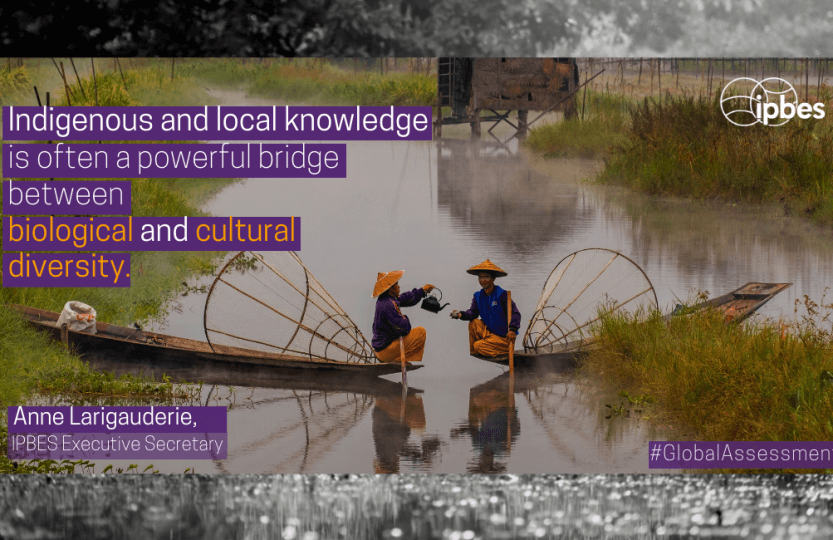As I reflect back on the impacts of the IPBES Plenary 7 Conference, I find it most urgent to focus on the implications of this research. What does sustainable management and preservation of biodiversity look like in practice?
It is evident that there is not just one single answer, local communities and small-scale contexts matter. This was highlighted in one of the regional applications of IPBES work discussed in a side event on the evening of May 1st. The discussion was led by panel representing a range of stakeholders from SwedBio, the NGO facilitators, to representatives from the Hin Lad Nai community in Thailand, to UNESCO and IPBES advisors involved in implementing the Pollination Assessment report in an indigenous community in Thailand. They all worked together through various mediums, for example walking workshops and group discussions, to put into context the importance of pollinators as outlined by the report in a local context. In this community, ritual and spiritual forests, as well as community forests and more intensely used land areas made up the array of habitat available for natural bee keeping. The elders have passed on their knowledge to future generations and the community was active in the dissemination of the IPBES report. This dialogue was meant to serve as an example of how science-policy can include indigenous and local knowledge, also known as ILK, into the policy process.
This discussion touched on the specifics of this intersectional approach to actively and fairly include indigenous and local knowledge into the conversation on biodiversity and ecosystem services. Though this case is focused on the local scale, there were broader ways that this can serve as an example for putting the urgent and extensive research on nature and its connection to people into practice.
The most resonating messages from this case study of inclusion of ILK in policy application were on:
- THE FORM OF KNOWLEDGE TRANSMISSION: The speakers emphasized the disparity in knowledge transfer for policy and local knowledge. They shared that quite often ILK captures long-term trends of nature and the way it relates to its people, but it is shared through spoken word. Thus, “these languages that hold a bulk of the knowledge on nature and its governance isn’t written down”. The panel stressed the importance of policy makers and other actors who want to incorporate ILK to go in person to these places, to talk to the local experts. In an encouraging aside, one speaker said that “knowledge holders do well when they speak to each other” (being careful of power dynamics and political contexts and etc.). Thus, environmental policy would benefit from experts being physically present in the communities they refer to and to learn from the experts embedded within.
- THE SCOPE OF INCLUSION: In congruence with the idea of knowledge transfer from local communities to inform research and policy, the recognition of these inputs for science-policy requires more than an acknowledgement in the contributions section of the published papers. One suggestion made was to make the local experts or indigenous community members who contributed also contributing authors on the manuscript. This would allow for more equitable recognition in academia of the contributions of local and traditional knowledge holders. It is truly important to also be mindful of when in the process and how the holders of ILK are included.
- THE SCALE OF KNOWLEDGE SHARING: A participant in the panel questioned whether this approach of incorporating ILK into science-policy research is scale-able. Her answer was met with a conditional yes. The panel agreed that when indigenous institutions function, meaning when the local governance is supportive and when the knowledge is actively managed, these forms of knowledge inclusion work. These lessons are valuable for those who hope to include ILK perspectives.
- SUCCESS OF BOTTOM-UP APPROACHES: Though not a new finding in the socio-political realm, I think it deserves repeating that these researchers also found that projects seeking to include ILK perspectives had more success when coming from the community, presenting their needs and concerns to be translated to policy, not when being prescribed from policy makers top down.
The validation and inclusion of indigenous and local knowledge is a vast and sensitive topic but crucial of ethical environmental policy. It was inspiring to hear from experts who have taken this approach to disseminate the results of the Pollinator Assessment Report. This side event was captivating to hear from the panel as well as attendees who offered perspective from their own communities and work experience. It was a nice contrast to the large and formal deliberations going on in the plenary hall, which are incredibly important but need to be actualized by people in communities and this was a prime example of how that may be done. It certainly made me hopeful to see and participate in more inclusive and empowering collaborations among science, policy and people.
More information (external link):
https://swed.bio/wp-content/uploads/2019/04/7017-0033-SRC-Report-Pollinators-dialouge_WEB.pdf
Title photo:
IPBES










why the speakers emphasized the disparity in knowledge transfer for policy and local knowledge?